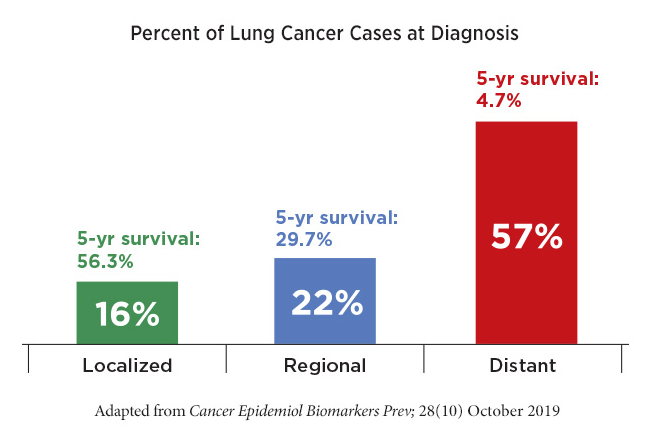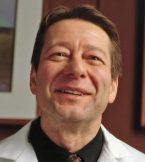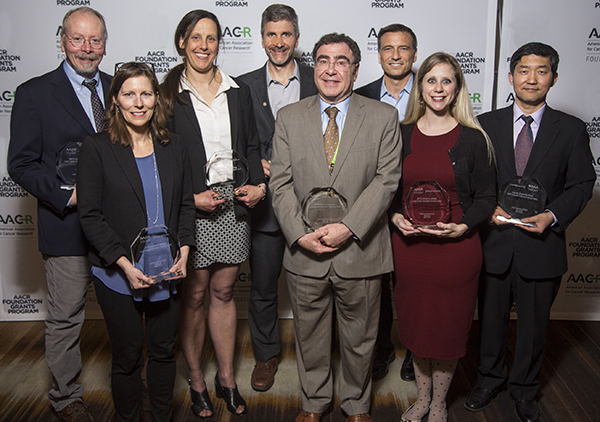AACR – J&J Lung Cancer Innovative Science Grants: Cutting-Edge Approaches to Cut Down Cancer Risk
By Christina Leah B. Kline, PhD

Lung cancer remains the number one cause of cancer-related death. This persistent dismal prognosis has been largely attributed to late-stage diagnosis, when 5-year survival rates are less than 5%. Although the potential of lung cancer screening to reduce lung cancer-related mortality has been demonstrated, there remains a need for more effective and less invasive early detection methods. The AACR-Johnson & Johnson Lung Cancer Innovative Science Grants are fueling research on lung premalignancy, including novel early detection and interception strategies.

With smoking the leading risk factor for lung cancer, the 2019 grant recipients are leveraging new approaches to boost smoking cessation success. The Innovation Science team led by Dr. Paul Cinciripini previously identified two groups of smokers: a low intrinsic reward sensitivity group (IRS-) whose brain responses to naturally rewarding stimuli are blunted, and high intrinsic reward sensitivity group (IRS+). Individuals in the IRS+ group are more likely to quit smoking than IRS- smokers. With this grant, the team is working on identifying genetic markers of reward sensitivity (IRS+/-), including those related to cessation, withdrawal, and response to cessation medications.

Dr. Mary Cooley and her Innovation Science team are exploring the potential of digital media to encourage high-risk smokers not only to stop smoking, but also to undergo lung cancer screening. Participants in their clinical trial will receive video-call cessation counseling and a decision-aide that introduces lung cancer screening as an option. The team is also interested in learning about smokers’ perception of lung cancer risk, including smokers’ interest in knowing their polygenic risk scores (a metric that quantifies one’s overall genetic predisposition to specific cancer risk or behaviors).
Although smoking is understood by most as the leading risk factor for lung cancer, 1 in 5 patients have never smoked. This indicates that other factors significantly predispose people to the disease. Part of the research efforts of the 2018 grant recipients involve studies on how the microbiome influences lung cancer risk.

The Innovation Science team co-led by Dr. Harvey Pass recently published their findings on how the lower airway microbiota composition differs between early and late stage lung cancer. This builds on earlier work showing that the lower airway microbiota of lung cancer patients is distinct from that in individuals with benign pulmonary nodules. In this current work, team members observed that poorer patient outcomes were associated with enrichment of the lower airway microbiota with oral commensal bacteria such as Veionella parvula. Using a preclinical lung cancer mouse model, they demonstrated that the presence of Veionella parvula in the lower airway exacerbated tumor growth and reduced survival. (The AACR has also issued a press release on these findings).
The work of Dr. Dominique Michaud and her Innovation Science Team also connects the microbiota to lung cancer risk. They had previously found that individuals with periodontal disease had a higher risk of lung cancer. This increased risk may be due, at least in part, to systemic inflammation, oral bacterial dissemination, and alterations in immune tolerance that stem from periodontitis. In their funded work, they are examining how changes in immune profiles in response to periodontal pathogen exposure are directly associated with lung cancer risk.
Successfully intercepting lung cancer hinges on a thorough understanding of how lung cancer develops. Dr. James DeGregori and his Innovation Science team are monitoring clonal evolution and microenvironmental features (including immune and inflammatory cells) to help map out the landscape that promotes lung cancer development.
With the anticipated progress of the AACR-Johnson and Johnson Innovation Science grant recipients, we look forward to employing next generation-tools and paradigms to prevent an age-old disease.